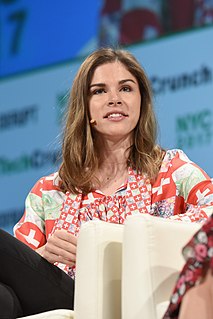A Quote by Jeremy Stoppelman
I think with every successful consumer Internet business, there will be lawyers that are interested in going after your company, especially when they think that there's a financial incentive.
Related Quotes
You should pursue your passion. If you're passionate about something and you work hard, then I think you'll be successful. If you start a business because you think you're going to make a lot of money at it, then you probably won't be successful, because that's the wrong reason to start a business. You have to really believe in what you're doing, be passionate enough about it so that you will put in the hours and hard work that it takes to actually succeed there, and then you'll be successful.
I am a big believer that you can have a successful business and give back; it's just about the intention behind starting your business. Of course, your margins aren't going to be as good as they would be if you were just a straight consumer goods fashion company, but obviously the purpose is so much greater. It takes some balancing to figure out how much you can afford to give, but it's definitely possible - and all the more meaningful, if you can strike that balance.
Think about when a digital business marries up with what I'll call 'digital intelligence.' It is the dawn of a new era about being a 'cognitive' business. When every product, every service, how you run your company can actually have a piece that learns and thinks as part of it, you will be a cognitive business.
At Travelers, we were much more opportunistic. It was very successful, but it wasn't an integrated financial services company. We had a property casualty company, a life company, a brokerage company. We were a financial conglomerate. It wasn't a unified, coordinated strategy of any sort. When it merged with Citi, that became a big issue; Citi, at that time, wasn't yet a fully integrated, coordinated company.

































